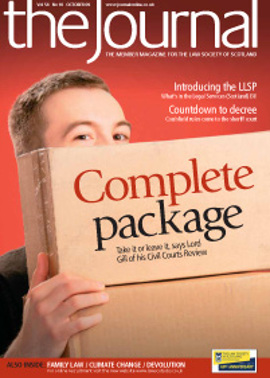How was it for you?

1 September was a very bad day to be a licensing lawyer. Not because we face up to redundancy and ruination – the drafters of the 2005 Act have seen to that. Instead we have to contemplate the very, very long list of tasks which, we have told colleagues brusquely, could not possibly be considered the other side of 1 September.
We also have to face up to the realities of life in the new system. How will it all work in practice? The omens are not good. In the words of one experienced clerk, “We should all have felt some elation at the achievement in moving from one controlling piece of legislation to another – but the appalling mess that is the 2005 Act totally soured any such sense of achievement.” Why such negativity?
Matters which seemed purely academic months ago are now having to be dealt with in real life, and the inadequacies of the drafting of the Act are being laid bare. Many of the problems stem from the fact that the drafters clearly had no experience of the practice of licensing law and, sadly, were too arrogant to listen to those who have.
In an earlier article I highlighted some of the problems with transfers. One interpretation of s 34, the section which allows an application by a non-licence holder, is even more troublesome than I had feared. The view has been expressed that transfer of a business alone does not justify invoking s 34. The use of the word “and”, it has been argued, means that there must be transfer of a business plus a death, incapacity or insolvency. While that interpretation would result in a ludicrous outcome, as a matter of statutory interpretation it can be defended.
Variations and alterations
Another important issue relates to variations. Until now, most of the variation applications have been to deal with changes made during transition, or to adapt to new board policies, usually relating to opening hours. But in future, most variations will deal with physical changes to the premises. Board approval must be sought before the work is done. What is the position once the variation has been granted? If it takes effect immediately, the licensee will no longer be trading in accordance with his (now varied) operating plan. It cannot have been Parliament’s intention that the premises should close until the work is done. Note that the provisional premises licence provisions do not help, as they relate to premises to be constructed for, or converted to, use as licensed premises. Some sort of provisional variation procedure would have been useful.
I would suggest a practical answer. If the board is happy with a variation application, it could approve it, while delaying the issue of the varied licence until the work was done. This would have the added advantage of giving the relevant officials the opportunity to inspect the completed work. Despite what some boards have put in their application forms, s 50 certificates relate only to new applications, not to variations.
A straw poll which I am carrying out suggests (at a fairly early stage) a cautious approval of my suggestion. One clerk in his response, comments: “it is a matter of regret that... we are already talking about additional non-statutory steps and procedures to get round defects in the legislation”.
Personal problems
It is a matter of even more regret that at the time of writing many personal licences have not yet been processed. While many in the trade have themselves to blame for the delay, at least one board had not dealt with a single personal licence by the end of transition, oblivious to the stress being caused to responsible licensees who had lodged their applications months ago. Empty vessels make the most noise: sadly, some of the noisiest boards have the emptiest list of applications granted and licences issued. You know who you are.
My sense of despondency is raised only by admiration for the very hard work and dedication of the vast majority of the people involved in the process over the last couple of years.
1 September? The earth didn’t move for me.
Tom Johnston, Young & Partners LLP, Dunfermline
In this issue
- The Combined Standard Clauses (2009 edition)
- Preserving a legal inheritance: settlement rights in the "Occupied Palestinian Territories"
- The European Court and the duty to investigate deaths
- Chief Executive's SGM address
- Shelter's online resources
- Musical copyright and contract
- The international swap shop
- Headline fortnight
- The Gill Report? What's not to like?
- Solicitor advocates and conflicts of interest
- Settlement in the West Bank
- Package deal
- RoS = economic value
- Defining the future
- Global leader?
- Dog's chance
- Coulsfield rules OK
- Money and your life
- Experts on the case
- At the hub, 10 years on
- Guardians: don't look to the Fund
- From the Brussels office
- Ask Ash
- Making the most of ABS
- Planning for growth
- The perils of posting
- ARTL: friend or foe?
- Where privacy prevails
- How was it for you?
- Agreeing rescues with creditors
- Adopting new solutions
- Divorce for gender change
- Scottish Solicitors' Discipline Tribunal
- Book reviews
- Website review
- A safe pair of hands tops the bill
- Law out of step






